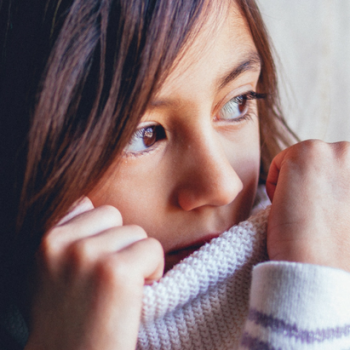Our best conversations usually happen around the dinner table.
Between bites of mac and cheese and chicken nuggets (or whatever “adult” food I’m attempting to get my children to swallow), we try our best to enter into conversation. Sometimes, we go around the table and say what we’re thankful for, because giving thanks really is one of the purest forms of prayer. Sometimes the boys sing, Thank you, God, thank you, God, for this food, for this food… It’s a song the older one learned at his little Lutheran preschool, the one he then inadvertently taught to his younger brother. And it’s one of our favorites now.

Image by Alex Hockett via Unsplash
Then, between bites of food and reminders to not run around the dining room table while we’re eating dinner, we attempt conversation. And it was around this time – mid-bite, mid-reminder – that my two-year old stopped chewing and yelled, “I’m bad!”
My husband and I looked at each other, but before we could respond, our four-year old son mimicked the words I hoped he’d heard a hundred times before:
“Brother, you’re not bad. You are a good person who sometimes makes bad choices. Okay, brother?”
My younger son nodded his head. He understood: he was good. His heart was good, even if he sometimes made bad decisions.
And I thought to myself, this is it. This is what we yearn for our children to believe, about themselves and about other humans in the world around them. This is what I’ve learned and begun to believe and desire to continue to trust about the world around me – because, after all, this is what God believes about us.
But I realize this belief hasn’t always been the case.
It’s one of the biggest debates in the church: is the heart good, or is the heart bad? In the conservative environment I was raised in, I don’t remember my mother wagging her finger at me, but I do remember her not liking my decisions. But that’s not the message I received from the Church.
I was bad. Sin was bad. Through Jesus, our actions are made good – but still, we were bad. Unbeknownst to me at the time, this belief in and of sinful depravity shaped the way I viewed everything and everyone around me.
Somewhere along the way, though, a shift occurred. Maybe it came from the eight slogging years I spent in seminary, or maybe it stemmed from reading a hoard of John and Stacy Eldridge books at the height of my twenties. Maybe it birthed from getting to know a new side of Jesus in the red-lettered section of the Bible, or maybe it happened upon unearthing the life-changing research of Brene Brown.
Whatever it was, I continue to profess belief in the Jesus who really, actually changes us from the inside out, who makes our hearts good. And, at least for now, I continue to pore this out to my children.
In a blog post from 2008, shame and vulnerability researcher Brene Brown gave a presentation about shame resilience. A couple of days later, she received an email from the daughter of a woman who’d experienced a life-changing moment at that seminar.
Her 75-year old mother wrote the following:
“I went to a talk at church and learned the difference between shame and guilt. I used the wrong one. I’m sorry. I didn’t know what I was doing. I haven’t like or approved of everything you’ve done, but I have always loved you and I’ve always known that you’re a wonderful daughter. I’m sure I told you that you were wrong and bad rather than telling you that I thought your actions were wrong. I’m sorry. I’m sure that’s hurt you.”
I read the mama’s words and my eyes fill with tears – not only does I’m sorry start and end the paragraph, but in the golden years of her life, the woman realizes the difference between believing one’s actions wrong and believing the entirety of one’s personhood wrong.
And this matters. It matters in relationships between parents and children, whether they’ve been at it for 52 years or for less than five years (like myself). It matters in relationships with our spouses and partners, and it matters in our friendships with other people, and it matters in our in intimacy with God.
It matters, it matters, it matters.
No matter where we are in life’s journey, we begin to realize and embrace and be changed by the truth that even though we are imperfect humans who sometimes make bad choices, we ourselves are not bad. For our hearts are good – and we, therefore, are worthy of love and belonging, yesterday and today and forever.
So, what do you say?
Should we really, actually begin to believe this for ourselves and for our children?
I sure hope this truth comes up again tonight around the dinner table, this time in between bites of drippy, cheese-filled tacos and dips into the bowl of guacamole. Because, no matter how and with whom you enter into the messy conversations of life with, might you remember that you – and your children – are good.
Cara Meredith is a writer and speaker from Seattle, Washington. She is a co-host on the Shalom in the City podcast and holds a Master’s of Theology (Fuller Seminary). She can be found on her blog, Facebook and Twitter.
Want more resources on parenting with progressive values?












